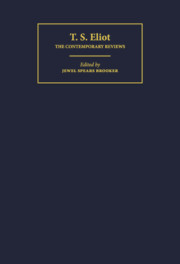Book contents
- Frontmatter
- Contents
- Series Editor's Preface
- Introduction
- Acknowledgments
- Prufrock and Other Observations (1917)
- Poems (1919); Ara Vos Prec (1920); Poems (1920)
- The Sacred Wood: Essays on Poetry and Criticism (1920, 1921)
- The Waste Land (1922)
- Homage to John Dryden (1924)
- Poems 1909–1925 (1925)
- For Lancelot Andrewes: Essays on Style and Order (1928, 1929)
- Dante (1929); Animula (1929); Marina (1930)
- Ash-Wednesday (1930)
- Selected Essays 1917–1932 (1932)
- Sweeney Agonistes (1932)
- The Use of Poetry and the Use of Criticism (1933)
- After Strange Gods: A Primer of Modern Heresy (1934)
- The Rock (1934)
- Murder in the Cathedral (1935)
- Collected Poems 1909–1935 (1936)
- The Family Reunion (1939)
- The Idea of a Christian Society (1939)
- East Coker (1940); Burnt Norton (1941); The Dry Salvages (1941); Little Gidding (1942); Four Quartets (1943)
- Notes Towards the Definition of Culture (1948, 1949)
- The Cocktail Party (1949, 1950)
- The Confidential Clerk (1954)
- The Elder Statesman (1959)
- Index
Sweeney Agonistes (1932)
Published online by Cambridge University Press: 10 March 2010
- Frontmatter
- Contents
- Series Editor's Preface
- Introduction
- Acknowledgments
- Prufrock and Other Observations (1917)
- Poems (1919); Ara Vos Prec (1920); Poems (1920)
- The Sacred Wood: Essays on Poetry and Criticism (1920, 1921)
- The Waste Land (1922)
- Homage to John Dryden (1924)
- Poems 1909–1925 (1925)
- For Lancelot Andrewes: Essays on Style and Order (1928, 1929)
- Dante (1929); Animula (1929); Marina (1930)
- Ash-Wednesday (1930)
- Selected Essays 1917–1932 (1932)
- Sweeney Agonistes (1932)
- The Use of Poetry and the Use of Criticism (1933)
- After Strange Gods: A Primer of Modern Heresy (1934)
- The Rock (1934)
- Murder in the Cathedral (1935)
- Collected Poems 1909–1935 (1936)
- The Family Reunion (1939)
- The Idea of a Christian Society (1939)
- East Coker (1940); Burnt Norton (1941); The Dry Salvages (1941); Little Gidding (1942); Four Quartets (1943)
- Notes Towards the Definition of Culture (1948, 1949)
- The Cocktail Party (1949, 1950)
- The Confidential Clerk (1954)
- The Elder Statesman (1959)
- Index
Summary
D. G. Bridson.
"Views and Reviews:
Sweeney Agonistes."
New English Weekly 2
(12 January 1933), 304.
It is difficult to criticize Mr. Eliot. It is difficult, in fact, to fix him “pinned and wriggling on the wall.” His elusiveness […] is invaluable to him. No sooner has a critic pronounced his later work a manifestation of his return to the fold, than a true disciple ups and denies the assertion flatly. The form is more regular, it seems, yet the implication is more subtle than ever. So let it be with Sweeney. But when Mr. Eliot labels his work “fragments of an Aristophanic melodrama,” he gives us an axis of reference.
In the first place, then, we do not readily think of Mr. Eliot as the modern Aristophanes. Aristophanic his moods may be, but Aristophanic they have certainly never appeared. The belly-shaking laughter of many passages in Ulysses are as Aristophanic as we choose to call them. But an Aristophanic melodrama by Mr. Eliot …! Sooner a parody of the Sermon on the Mount by St. Thomas Aquinas! And when a man of high seriousness (such we esteem Mr. Eliot) turns himself (as Mr. Eliot has done) to satiric melodrama or farce on the broad scale, we can hazard a guess at the result. […]
A good deal might be said about the form of the fragments now published. […] In the first place, their nature suggests that the whole is not conspicuous for what Frere called “the utter impossibility of the story.”
- Type
- Chapter
- Information
- T. S. EliotThe Contemporary Reviews, pp. 227 - 234Publisher: Cambridge University PressPrint publication year: 2004

